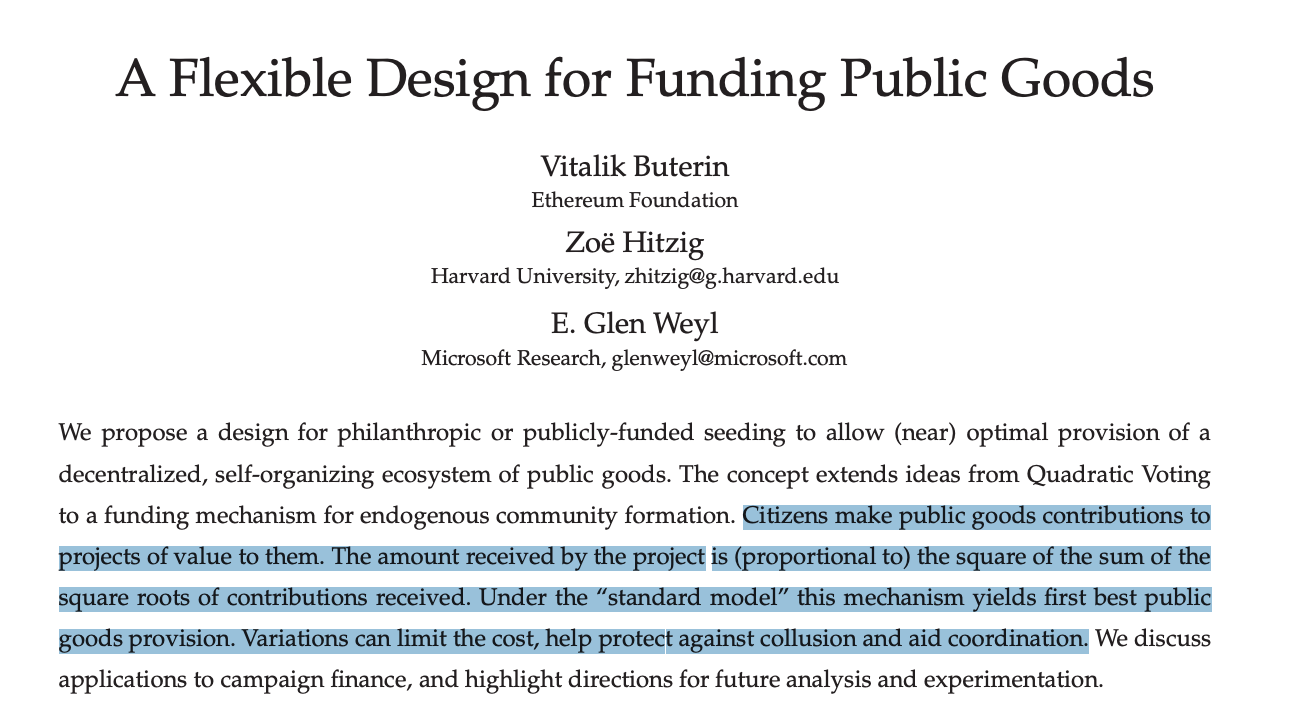Wouldn’t it be awesome if funding was available for creating public goods like Wikipedia, open source software, etc - Gitcoin Grants is making exactly this happen for the Web3 world.
Public benefits from public goods and Gitcoin wants to make sure no public good creator goes unrewarded. Gitcoin grants is a crowdfunding platform for Web3 open source projects. The platform is built on top of Ethereum.
To date they have disbursed over $60M in grants to over 2400 projects across 13 grant rounds. Popular Web3 projects such as POAP, Bankless, WalletConnect, Nori have benefitted from their grants. Recently they extended funding to include causes outside of web3 with inclusion of categories like Climate, Ukraine Support, Longevity in their past rounds.
What is Public Good
Scott Moore of Gitcoin defines public goods as goods that are simultaneously non-excludable and non-rivalrous. Non-excludable meaning it’s extremely difficult to stop someone from using the good, like roads and bridges, and non-rivalrous meaning that it’s abundant, and one person’s use of the good doesn’t substantially reduce the amount left for someone else.
Gitcoin for its web3 grant program defines it broadly as:
People & orgs who are building software, tools, media and other artifacts that are freely available AND create positive externalities to the world.
Traditionally the creators of public goods have been governments, funded by taxpayers to build common infrastructure such as roads, libraries, schools etc. Or Non Governmental Organizations (NGOs/NPO) when governments fail to provide, funding public goods through donations.
However on the internet creators of free, open source software and projects have had limited to non existing funding avenues despite their projects creating immense positive impact. Gitcoin aims to fill that funding void in web3.
Gitcoin Grants - For Whom, How To Apply and How it Works
The Gitcoin grants program runs for a two-week period every 3 months. Their twitter is a good way to stay on top of when their next round will happen.


For Whom
For public good creators in the Ethereum ecosystem, other web3 ecosystems (Polygon, Algorand, ZK Tech, Uniswap etc) and stated causes. Cause categories defined for the upcoming round are Climate, Blockchain Advocacy, Diversity, Equity and Inclusion (DEI) Round (the GR14 proposal is currently being finalized )
How It works
You can create a grant anytime on Gitcoin and start crowdfunding. But to be included for Gitcoin matching donation (a big donation pool created by big donors from various web3 entities) they review and disburse funds every 3 months. As project owner you get two weeks to rally maximum support after which Gitcoin counts the number of supporters per project and applies quadratic funding model to provide matching grants.
Annika Lewis of Gitcoin does a wonderful job of explaining this in a Twitter thread:


What is Quadratic Funding
Quadratic funding is a radically new way of funding programs in a highly democratic way. The quadratic funding model was defined in a paper published in 2018 by Vitalik Buterin, Founder of Ethereum, ‘A Flexible Design for Funding Public Goods.’
Gitcoin applies quadratic funding for its matching grants. Instead of going the traditional way of 1:1 matching donations (you give $20, I match it with $20), they use a math based approach
Gitcoin’s Quadratic funding for applying matching funds
Grant 1 gets $100 from 1 funder.
Grant 2 gets $100 from 10 funders.
At the end of the round, Grant 1 gets $10 in matching, Grant 2 gets $190 in matching.
Grant success on Gitcoin depends on how much the community cares about the project.
Nonprofits are learning from Gitcoin Method
Kimbal Musk of Big Green nonprofit (who recently launched a DAO to democratize grant-making) invited Kevin Owocki, Founder of Gitcoin to talk about the platform, quadratic funding and to explore how they can apply some of these innovative web3 tools in the nonprofit world.

Climate Solution Projects Pay Attention
In the Twitter Space Kimbal Musk announced $20K in donation to Gitcoin for climate round. If you are building solutions to address climate issues (web3 or not) go ahead and apply. For questions reach out to Gitcoin #grantsupport on Discord or All for Climate DAO #gitcoingrants Discord channel.
Summary
The topic of public goods is highly relatable to me. My family is full of public goods creators, my dad organized hundreds of free cataract and polio camps in remote parts of India. My partner is a creator of a wildly used open source software and I’m creating open web3 knowledge content for changemakers.
I understand the higher purpose that drives these creators and their relentless pursuit to keep creating and pushing forward without monetary incentives. I also understand the challenges and that many times public good projects shut down because it’s just not sustainable or sometimes you have to compromise to monetize.
So I’m glad organizations like Gitcoin exists to provide funding and we need more of them in every space.
Go Deeper 🐇
Essay on Public Good by Scott Moore, Cofounder Gitcoin
A panel discussion on Public Goods with Gitcoin’s Scott Moore, Alisha.eth of ENS, Ken Ng of Uniswap, and Karl Floersch of Optimism
A website to understand Quadratic Funding
A brief history of Gitcoin 2017-2022
Cause Round Eligibility Policy - Gitcoin Grants
What are your favourite digital public goods? I have many - Wikipedia, Khan Academy and Coffezilla (he exposes crypto scams)


